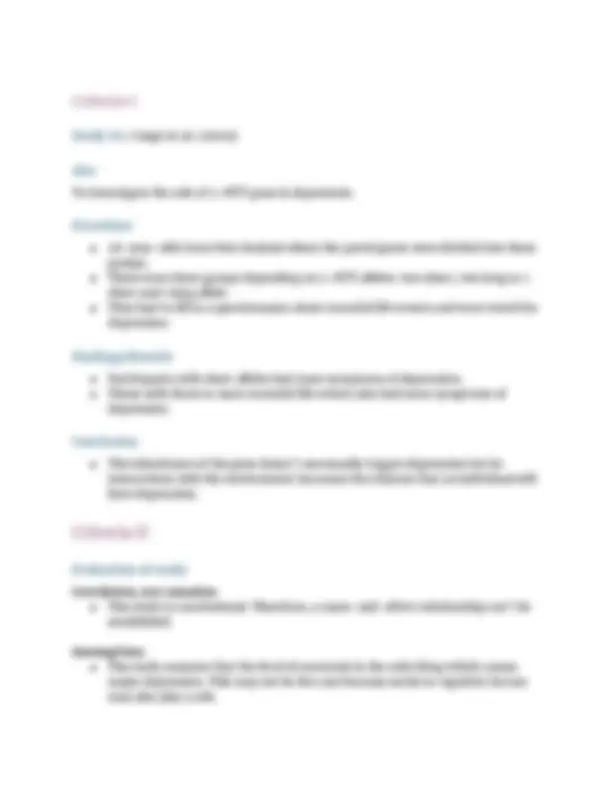




Study with the several resources on Docsity

Earn points by helping other students or get them with a premium plan


Prepare for your exams
Study with the several resources on Docsity

Earn points to download
Earn points by helping other students or get them with a premium plan
Community
Ask the community for help and clear up your study doubts
Discover the best universities in your country according to Docsity users
Free resources
Download our free guides on studying techniques, anxiety management strategies, and thesis advice from Docsity tutors
The role of genetics and environment in the development of depression. It discusses the criteria for identifying abnormal behavior and depression, the concept of concordance rates in twin studies, and specific studies investigating the impact of genes, such as the 5-htt gene, on depression. The document also evaluates the strengths and limitations of these studies and the diathesis-stress model.
What you will learn
Typology: Study Guides, Projects, Research
1 / 4

This page cannot be seen from the preview
Don't miss anything!



This is essentially the same thing as behaviour and genetics.
● Abnormal behaviour: behaviour that violates a norm in our society, is maladaptive, is rare given the context of the culture and environment and is causing the person distress in their daily life. ● Depression: a mood disorder that negatively affects how you feel, the way you think and how you act. Symptoms include, ○ Very low moods and self-esteem. ○ Pessimistic and believe they will never be happy again. ○ Lack of enjoyment in activities. ○ Insomnia and weight changes. Having a genetic disposition ● Some psychologists believe that both genetics and the environment have an impact on human behaviour. ● A gene is the unit of heredity, a portion of DNA which codes for a specific function or trait. We inherit 50% of our genes from each parent. ● Though these genes don’t code for complex behaviours like intelligence, they may be the building blocks of these behaviours. ● By mapping the human genome, scientists have found some genes that may be linked to depression. ● The concordance rate in twin studies can be used to determine whether a disorder has a genetic link. ● The 5-HTT gene has been associated with major depression because it controls the level of serotonin in the brain. Caspi et al. conducted research about this gene. Twin studies ● Twin studies are useful to investigate the influence of genetics on behaviour. Monozygotic twins (MZ) show a higher concordance rate than dizygotic twins (DZ). ● However, these concordance rates are never 100% because environmental factors like diet and exercise impact what genes are expressed.
To investigate the level of heritability of depression in twins.
● MZ twins had higher concordance rate than DZ but was less than 100%. ● The heritability of depression was around 38%.
● Since the concordance rate and heritability was less than 100%, this indicates that the environment also plays a role in triggering major depression. Criteria D
Sample bias ● Although genetics is universal, the environment that the participants were in would have been different than what people from other cultures experience. ● Therefore, sample bias is a limitation although not a major one. Ethical concerns ● Telling the twins about the results could have caused a self-fulfilling prophecy to occur. ● However, not informing the twins about the results is also unethical. ● In this case, it’s difficult to determine whether the twins should have been told the results or not.
Holistic, not reductionist (strength) ● The theory accepts the interaction between genetics and the environment. ● It doesn’t claim that genetics are the only cause of depression as shown by asking the participants about stressful events in their life. Do not mention sample bias for this study because genetics is universal. Criteria D
Strengths ● Twin studies are generally reliable because a large sample is used and usually produce consistent results. ● Models like the diathesis-stress models are not reductionist because it acknowledges that the environment also has an impact on depression, not just biological factors. Limitations ● It’s difficult to define “abnormality.” ● Depression may have different symptoms depending on the manual being used and may differ from culture to culture. ● A cause-and-effect relationship can’t be established. ● Even using twin studies, it’s hard to differentiate the influence of the environment and the influence of genes. ● Although specific genes related to depression have been identified, it’s not clear how those genes create depressive behaviour. ● Twins aren’t representative of the whole population. Generalising may be difficult.